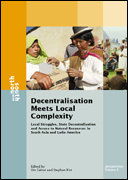
Decentralisation Meets Local Complexity
Local Struggles, State Decentralisation and Access to Natural Resources in South Asia and Latin America
edited by Urs Geiser and Stephan Rist
Publisher: Geographica Bernensia, Bern, Switzerland, 2009
‘Decentralisation’ has become a key ingredient of contemporary development policy. Its basic idea is convincingly simple: Hand over, or give back, power of decision-making from the central state to people organised at local levels. A number of programmes and projects are thus working on translating these thoughts into concrete practice. However, theory and everyday practice of decentralisation differ.
This book brings together eight coordinated case studies that focus on how decentralisation actually work (especially concerning natural resource governance) in Latin America (Bolivia, Mexico, Argentina) and South Asia (India, Nepal, Pakistan). They illustrate how well-intended, but generally top-down driven decentralisation initiatives aiming at takenfor-granted effects on empowering democratic decision-making, lead to the emergence of heterogeneous and often unexpected dynamics – so different from the initial policy intentions.
These ‘ground realities’ are read through contemporary social science discourses, highlighting that decentralisation is not primarily a managerial issue of improving governance procedures, but that it is inherently and deeply political, influenced by interests and agency, and thus contingent in its outcomes. This reveals a challenging dilemma: though intended to give local realities more room, actual decentralisation programmes often follow blueprints, which then encounter “local complexities”. These complexities encompass already ongoing contestations among social groups, conflicting expectations upon, and interpretations of, the meaning of decentralisation, and often a strategic handling of decentralisation as a new resource to be tapped. However, complexities are not limited to the local sphere. In many instances, various decentralisation programmes compete with each other, often in a non coordinated manner.
In an innovative way, the book shows that, because of this dilemma, decentralisation can trigger the creation of new social arenas in which very basic notions of citizenship, state and the principles through which they interact are re-negotiated. These new arenas offer opportunities, but also bear risks. The huge challenge for decentralisation, therefore, is to navigate the thin line between the creation of inclusive room for local political participation, and the risk of fuelling social exclusion by the very intention of re-distributing power.
Geiser, Urs and Rist, Stephan. 2009. Decentralisation Meets Local Complexity. Local Struggles, State Decentralisation and Access to Natural Resources in South Asia and Latin America.. Bern: Geographica Bernensia, Switzerland.
Language
English
 Download Book
Download Book Download Flyer
Download Flyer Download book review appearing in Journal of South Asian Development
Download book review appearing in Journal of South Asian Development